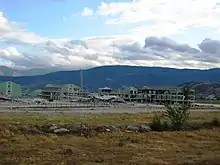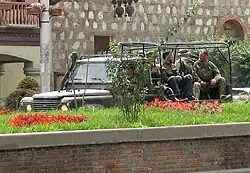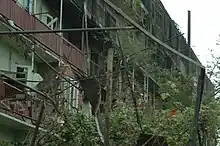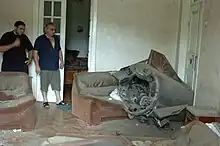Occupation of Gori
The Occupation of Gori was the military occupation of Gori and its surrounding areas by Russian military forces, which started on 13 August 2008 as part of the Russo-Georgian War; it ended with the withdrawal of Russian units from the city on 22 August 2008.
| Occupation of Gori | |||||||
|---|---|---|---|---|---|---|---|
| Part of Russo-Georgian War | |||||||
 Gori Occupation of Gori (Georgia) | |||||||
| |||||||
| Belligerents | |||||||
|
|
| ||||||
| Commanders and leaders | |||||||
|
| Unknown | ||||||
| Strength | |||||||
|
Elements of the 58th Army Russian Air Force Ossetian militia |
Georgian Armed Forces Georgian Police | ||||||
| Casualties and losses | |||||||
| None |
9 Policemen killed 3 Policemen missing | ||||||
|
Civilian casualties: 14 civilians killed,[1] 22 missing 1 Dutch journalist killed[2] | |||||||
| Refugees: At least about 56,000[3] | |||||||
Background and initial airstrikes
Gori is a strategic city in central Georgia,[4] about 25 km (16 mi) from Tskhinvali.[5] Gori is a major military installation and transportation hub in Georgia.[6] 75 tanks and armored personnel carriers (a third of the Georgian military's arsenal) were assembled near Gori on 7 August.[7]
Around 6:27 AM on 9 August 2008, Reuters reported that two Russian fighters had bombed a Georgian artillery position about 10 km north of Gori.[8][9] On 9 August, a Russian air attack targeted military barracks in Gori. In the resulting explosion, besides the base, several apartment buildings and a school were also damaged.[10] The Georgian government reported that 60 civilians were killed when bombs hit the apartment buildings.[11] According to the Russian media, Russian aircraft dropped three bombs on an armament depot, and the façade of one of the adjacent 5-story apartment buildings suffered damage as a result of exploding ammunition from the depot.[12] Russian aircraft had bombed at least five Georgian cities by 9 August.[13]
Georgian abandonment

.jpg.webp)
Following its defeat in Tskhinvali, the Georgian Army regrouped at Gori.[14] Georgian military entered the city on 10 August.[15] On 10 August, BBC reported that people were leaving Gori because they feared of Russian advance towards the city.[16] The United Nations High Commissioner for Refugees (UNHCR) and World Food Programme determined that about 80 percent of residents had left Gori as of 10 August.[3] Russians began advancing towards Gori.[6]
On 11 August 2008, the Georgian forces retreated from Gori. A senior Georgian security official, Kakha Lomaia, said that the troops were ordered to defend Tbilisi.[17][18] Police sealed off the highway from Tbilisi, and did not allow any cars into the city. The Russian attacks were met with Georgian artillery firing towards South Ossetia, and at least six Georgian helicopters were reported to have also attacked targets in South Ossetia.[19] A Times reporter described the Georgian withdrawal as "sudden and dramatic", saying that the "residents watched in horror" as their army abandoned their positions.[19] Georgian tanks and armored personnel carries fled to Tbilisi. A tank exploded on the mountain road due to unspecified reasons, and an armored car pushing it out of the way also caught fire. Georgian infantry fled the city by any means available. Five soldiers escaped the city on one Quad bike.[19] By late 11 August, Gori was deserted after most remaining residents and Georgian soldiers had fled.[2] Initial Georgian reports that Russian troops were in Gori, were later discounted by Georgia.[20]
Georgian armed forces concentrated on holding Mtskheta, 15 miles (24 km) from the capital Tbilisi.[21] Deputy Defense Minister Batu Kutelia said that the defense line was being moved to Mtskheta.[22]
The final air attacks
On 12 August 2008, a Dutch television journalist Stan Storimans was killed and another journalist injured when Russian warplanes bombed the city.[2] As a result of the explosion 7 people were killed, over 30 were injured.[23] Georgian officials said Russian forces had been targeting the city's administrative buildings; the university of Gori and its post office were on fire after the bombings.[2] Russia's deputy head of the General Staff, Colonel-General Anatoliy Nogovitsyn, denied that Russian forces had attacked the town.[24] That day, a missile struck the Gori Military Hospital.[25]
Human Rights Watch (HRW), an international rights group, accused Russia of deploying indiscriminately deadly cluster bombs in civilian areas.[26]
Russian military official denied using cluster munitions. Numerous unexploded submunitions were subsequently found by local population in the Gori district and the HRW documented them.[27]
Russian occupation

Several hours after the ceasefire agreement was reached, a Russian tank battalion occupied parts of Gori. Rumors of a possible attack on Tbilisi circulated.[4][28] Russian troops took control of Gori on 13 August 2008.[29][30][4] Russian troops said they were removing military hardware and ammunition from an arms depot outside Gori.[31] A Russian armored column left Gori, traveling along the main road to Tbilisi. Russian forces then halted their advance and camped out in a field about an hour's drive from Tbilisi.[32]
In the morning of 14 August,vehicles from the Georgian police and military prepared to re-enter Gori. Russian major general Vyacheslav Borisov told Aleksandre Lomaia, secretary of Georgia's National Security Council, that the residents of Gori were not disturbed by the Russians' presence.[33] Later, Russian forces allowed Georgian police to return.[34] Vyacheslav Borisov claimed that the city of Gori was controlled jointly by Georgian Police and Russian troops. He further said that Russian troops would start leaving Gori in two days.[35] But joint patrols soon broke down because of apparent discord among personnel and the city returned to full Russian control. More than 30 police officers returned to a Georgian post outside the city.[29][36]
Russian forces pushed to about 25 miles (40 km) from Tbilisi, the closest during the war; they stopped in Igoeti 41°59′22″N 44°25′04″E. The parts of Georgia’s army, which had manned a narrow front in the immediate vicinity down the road, maintained their positions. The Russian move coincided with the U.S. Secretary of State Condoleezza Rice’s meeting with Georgian president Saakashvili on 15 August.[37]
"Now Ossetians are running around and killing poor Georgians in their enclaves," said Major-General Vyacheslav Borisov on 14 August. A Russian lieutenant said: "We have to be honest. The Ossetians are marauding."[38] Answering a journalist's question, a Russian lieutenant colonel said: "We're not a police force, we're a military force. [...] It's not our job to do police work."[38] The New York Times noted, that "the Russian military might be making efforts in some places to stop the rampaging".[38][39] On 17 August, BBC reported that humanitarian aid was being delivered to the city. The Russian commander in Gori said his troops were staying to prevent looting and would leave when Georgian police was ready to take over.[40]
According to the Hague Convention, an occupying power has to insure public order and safety in the occupied areas.[41] The Russian human rights group Memorial called the attacks by South Ossetian militia "pogroms".[42]
Russian pullout of Gori
The last Russian military formations left the city late on 22 August 2008, and Georgian law enforcement units moved into Gori shortly thereafter.[43][44]
 Georgian conscripts in Tbilisi after retreating from Gori
Georgian conscripts in Tbilisi after retreating from Gori A burnt apartment building where 16 people were reportedly killed
A burnt apartment building where 16 people were reportedly killed The propulsion stage of a Russian missile in a civilian apartment on August 25, 2008
The propulsion stage of a Russian missile in a civilian apartment on August 25, 2008 Pictures on display outside the Georgian parliament showing the destruction after Russian bombings in Gori
Pictures on display outside the Georgian parliament showing the destruction after Russian bombings in Gori
References
- "The Tanks of August" (PDF). Centre for Analysis of Strategies and Technologies. p. 60. Archived (PDF) from the original on 2011-01-28. Retrieved 2014-03-29.
- "Dutch journalist killed in Russian bombing of Gori". International Herald Tribune. 12 August 2008. Archived from the original on August 13, 2008.
- "Humanitarian effort begins in Georgia". CNN. 11 August 2008. Archived from the original on 18 August 2008. Retrieved 27 August 2008.
- "Bush, Sending Aid, Demands That Moscow Withdraw". The New York Times. 13 August 2008. Archived from the original on 29 October 2017. Retrieved 22 February 2017.
- "Georgia: All-Out War Looms in South Ossetia". EurasiaNet. 7 August 2008. Archived from the original on 6 May 2009. Retrieved 29 March 2014.
- "Russians push past separatist area to assault central Georgia". 11 August 2008. Archived from the original on 15 August 2008.
- "Did Saakashvili Lie? The West Begins to Doubt Georgian Leader". Der Spiegel. 15 September 2008. Archived from the original on 16 September 2008. Retrieved 29 March 2014.
- "Russian jets bomb Georgia - Reuters witness". Reuters. 9 August 2008. Archived from the original on 11 August 2008.
- Российские ВВС разбомбили позиции грузинской артиллерии близ Гори (in Russian). Lenta.ru. 9 August 2008. Archived from the original on 11 August 2008.
- "Georgia conflict: Screams of the injured rise from residential streets". The Telegraph. 9 August 2008. Archived from the original on 11 August 2008. Retrieved 2 April 2018.
- "Russian jets attack Georgian town". BBC. 9 August 2008. Archived from the original on September 23, 2008.
- Пропагандисты не отрабатывают зарплату (in Russian). RosBalt. 11 August 2008. Archived from the original on 17 January 2010.
- Barnard, Anne (9 August 2008). "Georgia and Russia Nearing All-Out War". The New York Times. Archived from the original on 24 March 2019. Retrieved 22 February 2017.
- Barabanov, Mikhail (12 September 2008). "The August War between Russia and Georgia". Moscow Defense Brief. Centre for Analysis of Strategies and Technologies. 3 (13). Archived from the original on April 16, 2009.
{{cite journal}}: CS1 maint: unfit URL (link) - "Moscow issues ultimatum as fighting in Georgia spreads". The New York Times. 11 August 2008. Archived from the original on 7 October 2020. Retrieved 22 February 2017.
- "Eyewitness: Mood shifts in Gori". BBC. 10 August 2008. Archived from the original on 11 August 2008. Retrieved 12 October 2014.
- "Georgia: Russia fighting on several fronts as Georgian troops withdraw to defend Tbilisi". The Telegraph. 11 August 2008. Archived from the original on 13 August 2008. Retrieved 2 April 2018.
- "'I don't know which side to blame'". The Guardian. 12 August 2008. Archived from the original on 2 September 2013. Retrieved 15 December 2016.
- Halpin, Tony (12 August 2008). "Georgian army flees in disarray as Russians advance". The Times. Archived from the original on 12 August 2008.
- "Russian troops advance in Georgia". BBC News. 12 August 2008. Archived from the original on 10 October 2020. Retrieved 11 October 2014.
- "Russian president Dimitry Medvedev orders end to conflict in Georgia". Archived from the original on 2020-10-01. Retrieved 2020-09-13.
- "Russian Troops Launch Ground Offensive in Georgia (Update3)". Bloomberg. 11 August 2008. Archived from the original on 4 March 2010. Retrieved 10 March 2017.
- "Victims of Last Year's Tragedy Remembered in Gori". media.ge. 12 August 2009. Archived from the original on 15 August 2009.
- "Blasts rock Georgian town Gori, several dead". Reuters. 12 August 2008. Archived from the original on 21 August 2008.
- "The new Cold War: Crisis in the Caucasus". The Independent. 17 August 2008. Archived from the original on 8 July 2018. Retrieved 30 October 2017.
- Hines, Nico (15 August 2008). "Russia accused of dropping cluster bombs on Georgian civilians". The Times. Archived from the original on 3 September 2008.
- "Georgia: Civilians Killed by Russian Cluster Bomb 'Duds'". Human Rights Watch. 22 August 2008. Archived from the original on 4 January 2012. Retrieved 4 December 2016.
- "Russian tanks deter Georgian entry to Gori". Associated Press. 14 August 2008. Archived from the original on 19 August 2008.
- Levy, Clifford J. (14 August 2008). "Russia Vows to Support Two Enclaves, in Retort to Bush". The New York Times. Archived from the original on 14 December 2018. Retrieved 22 February 2017.
- "The Tanks of August" (PDF). Centre for Analysis of Strategies and Technologies. p. 74. Archived (PDF) from the original on 2011-01-28. Retrieved 2014-03-29.
- Shchedrov, Oleg (13 August 2008). "Russia says removing Georgian arms from town of Gori". Reuters. Archived from the original on 8 October 2020. Retrieved 1 July 2017.
- "Russian feint toward Tbilisi shows truce fragile". Associated Press. 13 August 2008. Archived from the original on 20 August 2008.
- Bahrampour, Tara (14 August 2008). "A Convoy Heads for Gori to Investigate Rumors of Plunder". The Washington Post. Archived from the original on 29 June 2011.
- "Russian Forces Still 'Occupy' Gori, Gradual Withdrawal Predicted". AHN. 14 August 2008. Archived from the original on 22 August 2008.
- "Russian Military Will Leave Gori in 2 Days". 14 August 2008. Archived from the original on 30 March 2014. Retrieved 29 March 2014.
- "Crisis fuels U.S.-Russia animosities". Los Angeles Times. 15 August 2008. Archived from the original on 15 August 2008. Retrieved 27 August 2008.
- C. J. Chivers (15 August 2008). "For Russian Armor, Even With Rice in Georgia, Cease-Fire Is Not a Red Light". The New York Times. Archived from the original on 5 March 2019. Retrieved 22 February 2017.
- Tavernise, Sabrina; Siegel, Matt (14 August 2008). "Signs of Ethnic Attacks in Georgia Conflict". The New York Times. Archived from the original on 8 October 2020. Retrieved 22 February 2017.
- "Russia/Georgia: Militias Attack Civilians in Gori Region". Human Rights Watch. 16 August 2008. Archived from the original on 18 August 2008. Retrieved 4 December 2016.
- "Russia pledge on Georgia pull-out". BBC News. 17 August 2008. Archived from the original on 17 August 2008.
- "Hague Convention, Article 43". The Avalon Project. Archived from the original on 30 April 2009.
- "Chechnya: Search of Sulim Yamadaev, former battalion "Vostok" commander, cancelled". Caucasian Knot. 22 August 2008. Archived from the original on 7 July 2011.
- "Police Back in Gori". Civil.Ge. 23 August 2008. Archived from the original on 27 August 2008. Retrieved 24 August 2008.
- "Georgia conflict: Russians pull out of Gori". The Telegraph. 22 August 2008. Archived from the original on 20 July 2019. Retrieved 2 April 2018.